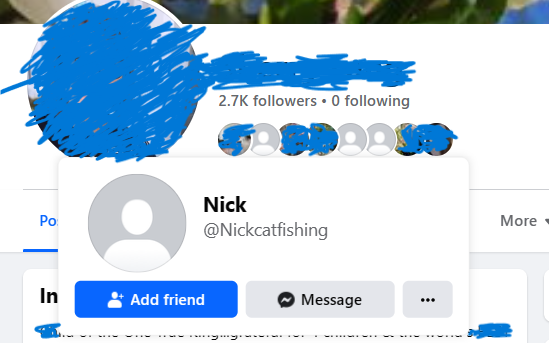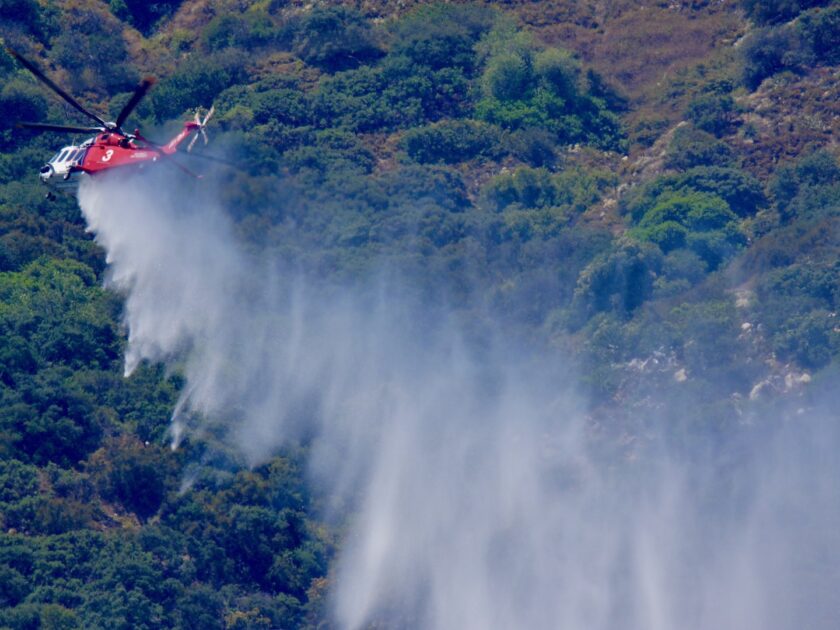Risk is what you don’t see, unintended consequences are what you don’t realize. Chasing numbers alone without regard or reason is meaningless with unintended consequences.
Although her nearly 3k followers aren’t publicly shown on her Facebook profile, what she doesn’t realize is when she publicly posts her daily, family updates to her community of uninformed followers, she is exposing them to threats unknowingly. I happened to hover over the few follower images at the top of her profile and saw that Nick is actually @Nickcatfishing which I guarantee is a fake profile as likely the others who have no profile picture.

The unintended consequences of her chasing numbers (followers, supplement sales and essentially money) are putting her entire community (people I know from the town I grew up in) at risk. Catfishing is preying on victims to steal their identity or their money through financial scams. By allowing anyone to follow her with no vigilance and then posting everything publicly, she is exposing them to these scammers.
When you like or comment on a post from someone posting publicly, your words and reactions have now become Public, and you have entered and remain in that very unprotected domain. Followers like Nick will watch for this and find who to prey on next especially if parts of your social media profile is public also.
What is catfishing and how do you spot it? | NordVPN
Here’s how it plays out.
Anything can be manipulated. Any person can be manipulated into thinking something is real especially with the proliferation of AI. As this grows, so does the need for awareness and vigilance.
Facebook cloning – this happens all the time including several of my family members. If you post publicly on Facebook AND your Friends list is public, anyone can download your pictures and create a profile exactly like yours and then send Friend requests to everyone in your list. Keep your profile private including your Friends list.
Actual “hacking” into your Facebook/Instagram account is when someone gains access to your account using your e-mail and password. Change your password to a strong one and enable 2-factor authentication.
Phishing – e-mails or direct messages are sent with sketchy links that will download malware or capture login credentials on spoofed websites.
Quizzes and games – designed to elicit personal information in the answers, then hacking accounts with it.
Prizes – claims designed to obtain personal information or money from the victim.
Shopping – sales of counterfeit goods under a faux brand account.
Suspicious links about you – messages that claim to contain impressive or embarrassing videos about you that usually contain malware.
Coupons and discounts – apps that claim to get you discounts and coupons but will only install malware on your device.
Romance – friend requests and direct messages that attempt to create a romantic interest with the goal to steal money from the victim.
Unrealistic job offers – promises of dream jobs with little effort, in exchange for a user’s personal information.
Charity pleas – fake charities to get donations during times of disaster.
The fierce Santa Ana winds wildly spread the LA fires and ensuing devastation to the homes and communities with the resulting loss unreal. It’s what we see widespread all across news outlets and social media. I experienced wildfires firsthand living in LA and visiting other parts of California. The apocalyptic destruction is real.
But what is also real and what we don’t see are the millions of people losing all their money, their life savings and their livelihood to unscrupulous people. Story after story reported but the magnitude is lost in the indignity of being a victim. It wasn’t a natural disaster that took everything away, it was lapse in their own judgment.
Destruction from fires, hurricanes, tornados, earthquakes/tsunamis is seen and tangible. The loss from scams and fraud is often unseen and intangible. It’s what you don’t see, hear or remember in the news because it’s not some catastrophic event. The number of people often elderly who have lost their life savings and homes to cyber scam operations run by transnational criminal groups overseas is growing. There isn’t insurance, Federal assistance or donations to help them.
“In the U.S., state and local enforcement agencies often turn down or ignore victims of cyber-crime due to a lack of investigative capacity, limited mandate to prosecute cybercrime, and a lack of awareness of the sprawling scale of this issue. Currently, even basic data about the types and approaches for fraud in the United States is not widely available.”
The FTC and other outlets are trying to educate the unknowing consumer, but this is a daunting endeavor. The U.S. reported the highest amount of loss per capita and the current approach to preventing, detecting and responding to cybercrimes is insufficient. It’s also not what gets spread like wildfire on the Internet or the news.
Educate yourself on the types and red flags of cyber scams and fraud. There are red flag warnings, but they are not broadcast like natural disasters. Share with those you treasure to keep them secure, private and smart.
“The worst thing about social media is that it rewards unreasonable behavior…Anything dumb. Anything emotional. Anything overly simplistic, and it seems to spread like the wind.” – Tom Goodwin, Business Transformation – AI
Those in Altadena (north of Pasadena) who lost their homes will need the most support: Supporting Our Community: Eaton Canyon Fire Relief & Recovery Fund | Pasadena Community Foundation.

